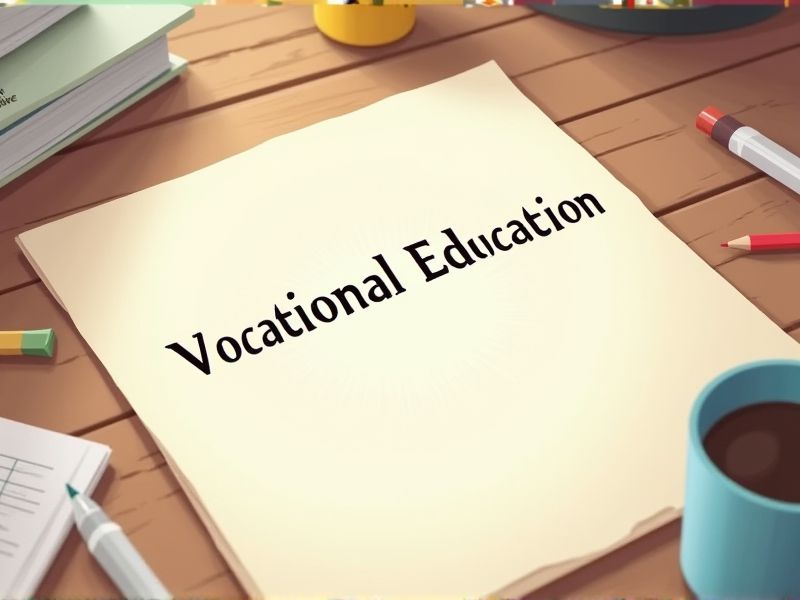
Vocational Education Instructors play a critical role in equipping students with practical skills for various trades and professions. Ensuring instructors possess relevant certifications verifies their expertise and commitment to high-quality education. Certifications help maintain industry standards, ensuring that instructors are updated with current practices. These are some key certifications that may be required for a Vocational Education Instructor.
Certified Vocational Educator (CVE)
A Certified Vocational Educator (CVE) ensures that vocational education instructors possess standardized skills and knowledge necessary for effective teaching. Standardization improves the quality of vocational training, which directly impacts student outcomes and workforce readiness. By having certified instructors, educational institutions can offer programs that meet industry requirements and address specific occupational needs. As vocational fields evolve, a CVE designation supports continuous professional development, aligning teaching practices with current technological advancements and market trends.
Certificate in Adult and Vocational Education
A Certificate in Adult and Vocational Education equips instructors with specialized skills to effectively teach adult learners, who often have different educational needs compared to younger students. This credential ensures that vocational education instructors are adept at tailoring their teaching approaches to diverse learning styles, which enhances student engagement and comprehension. Institutions and employers recognize the certificate as a mark of quality, influencing hiring decisions and opening up more career opportunities for instructors. A structured understanding of adult education principles allows instructors to design comprehensive curriculums that better align with industry standards and requirements.
Instructional Design Certification for Vocational Training
Obtaining an Instructional Design Certification equips vocational education instructors with necessary skills to create effective and engaging learning experiences tailored to different learner needs. The certification enables instructors to develop structured curricula that align with industry standards, ensuring students gain relevant skills for the workforce. By understanding instructional design principles, instructors can more effectively assess learning outcomes, leading to improved educational effectiveness. Certification enhances an instructor's credibility and career opportunities in vocational education settings.
Competency-Based Education Certification
Competency-Based Education Certification ensures vocational education instructors possess the necessary skills to effectively teach practical and industry-relevant content. Students gain more hands-on experience and expertise, enhancing job readiness and employment opportunities. It also aligns educational outcomes with industry standards, leading to a more competent workforce. Continuous certification updates maintain teaching quality and adapt to evolving industry needs.
National Career Readiness Certification (NCRC)
The National Career Readiness Certification (NCRC) offers a standardized measure of essential workplace skills for vocational education instructors. Employers and educational institutions value instructors with NCRC as it assures quality training for students entering the workforce. Having this certification ensures instructors possess critical thinking, problem-solving, and communication skills, which are crucial in preparing students for real-world job demands. Instructors with NCRC are better equipped to align their teaching strategies with industry standards, enhancing student outcomes and employability.
OSHA Safety Certification
OSHA Safety Certification ensures that vocational education instructors understand workplace safety protocols, reducing the likelihood of accidents in training environments. This certification equips instructors with the knowledge to teach students about potential hazards, fostering a culture of safety among future workers. Compliance with OSHA standards can minimize legal liabilities for educational institutions, protecting them from potential fines and legal issues. Instructors with OSHA certification demonstrate a commitment to safety, enhancing their credibility and the institution's reputation in providing quality education.
First Aid and CPR Certification
Vocational education instructors often work in environments where students handle machinery or tools, increasing the risk of accidents, and a First Aid and CPR Certification enables them to respond effectively to medical emergencies. In some vocational settings, such as construction or automotive workshops, the certification might be a legal requirement, ensuring compliance and safety regulation adherence. First Aid and CPR training equips instructors with the ability to stabilize a situation until professional medical help arrives, reducing potential injury severity. Certification fosters a culture of safety and readiness, enhancing the learning environment by reassuring students and parents of the institution's commitment to well-being.
Technology Integration in Education Certification
Technology Integration in Education Certification ensures vocational education instructors are equipped with the skills to implement relevant digital tools, enhancing both teaching methods and student engagement. As the job market increasingly relies on technological proficiency, instructors with this certification can better prepare students for industry demands. This certification also promotes the adaptation of teaching to diverse learning paces and styles, which is crucial for effective vocational training. By acquiring the certification, instructors can enhance their credibility and effectiveness, attracting more students to their programs.
Professional Development in Teaching and Learning Certificate
Obtaining a Professional Development in Teaching and Learning Certificate equips vocational education instructors with up-to-date pedagogical skills, enhancing their ability to deliver effective training. By mastering new instructional methods, instructors can better meet the diverse needs of students, increasing overall engagement and retention. Formalized professional development serves as a catalyst for personal growth, boosting educators' confidence and motivation. Continuous learning and certification can contribute to an institution's reputation by ensuring a consistently high standard of education.
Industry-Specific Technical Certification (customizable)
Employers increasingly demand up-to-date expertise, making industry-specific technical certifications essential for vocational education instructors. As industries evolve, customizable certifications ensure instructors teach with the latest skills and knowledge. These certifications help maintain a high standard of instruction, directly benefiting student competency and readiness. With industry-tailored expertise, instructors can better align curricula with current market needs, enhancing student employability.
Summary
You will likely enhance your teaching methodologies after obtaining certifications as a Vocational Education Instructor. These credentials can increase your credibility and trust with students and administrative staff. Students may benefit from high-quality, industry-relevant skills under your guidance. Schools may also see improved student outcomes and increased program enrollment.
